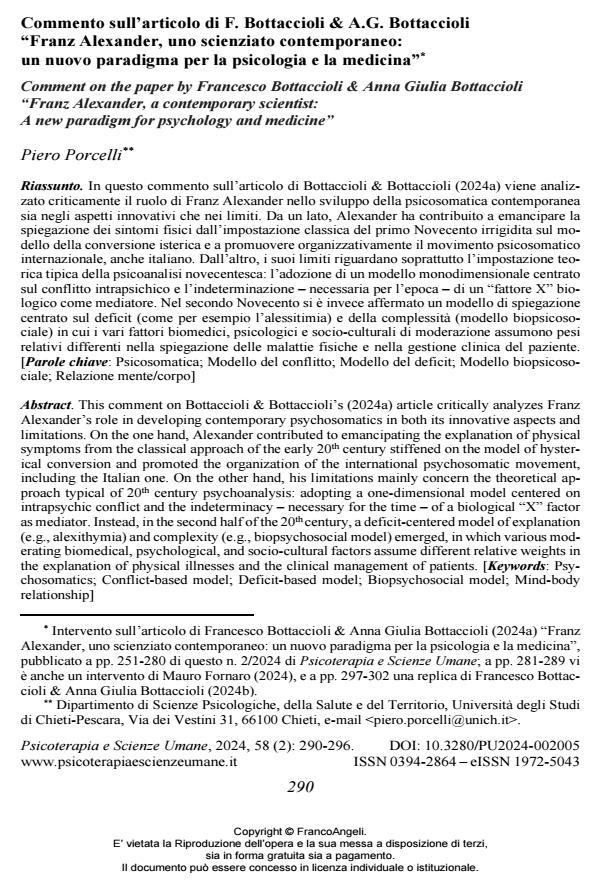Comment on the paper by Francesco Bottaccioli & Anna Giulia Bottaccioli “Franz Alexander, a contemporary scientist: A new paradigm for psychology and medicine”
Journal title PSICOTERAPIA E SCIENZE UMANE
Author/s Piero Porcelli
Publishing Year 2024 Issue 2024/2
Language Italian Pages 7 P. 290-296 File size 52 KB
DOI 10.3280/PU2024-002005
DOI is like a bar code for intellectual property: to have more infomation
click here
Below, you can see the article first page
If you want to buy this article in PDF format, you can do it, following the instructions to buy download credits

FrancoAngeli is member of Publishers International Linking Association, Inc (PILA), a not-for-profit association which run the CrossRef service enabling links to and from online scholarly content.
This comment on Bottaccioli & Bottaccioli’s (2024a) article critically analyzes Franz Alexander’s role in developing contemporary psychosomatics in both its innovative aspects and limitations. On the one hand, Alexander contributed to emancipating the explanation of physical symptoms from the classical approach of the early 20th century stiffened on the model of hysterical conver-sion and promoted the organization of the international psychosomatic movement, including the Italian one. On the other hand, his limitations mainly concern the theoretical approach typical of 20th century psychoanalysis: adopting a one-dimensional model centered on intrapsychic conflict and the indeterminacy – necessary for the time – of a biological “X” factor as mediator. Instead, in the second half of the 20th century, a deficit-centered model of explanation (e.g., alexithymia) and complexity (e.g., biopsychosocial model) emerged, in which various moderating biomedical, psy-chological, and socio-cultural factors assume different relative weights in the explanation of phys-ical illnesses and the clinical management of patients.
Keywords: Psychosomatics; Conflict-based model; Deficit-based model; Biopsychosocial model; Mind-body relationship
- Alexander F. (1946). La esperienza emozionale correttiva. Psicoterapia e scienze umane, 1993, 27, 2: 85-101 (trad. it. dei capitoli 2, 4 e 17 di: Alexander F., French T.M. et al., Psychoanalytic Therapy: Principles and Applications. New York: Ronald Press, 1946); edizione su Internet con una introduzione di Paolo -- Migone: www.psychomedia.it/pm/modther/probpsiter/alexan-1.htm).
- Bottaccioli F. & Bottaccioli A.G. (2024a). Franz Alexander, uno scienziato contemporaneo: un nuovo paradigma per la psicologia e la medicina. Psicoterapia e Scienze Umane, 58, 2: 251-280. DOI: 10.3280/PU2024-002002
- Bottaccioli F. & Bottaccioli A.G. (2024b). Risposta agli interventi di Mauro Fornaro e Piero Porcelli. Psicoterapia e Scienze Umane, 58, 2: 297-302. DOI: 10.3280/PU2024-002006
- Bradfield J.W.B. (2006). A pathologist’s perspective of the somatoform disorders. Journal of Psychosomatic Research, 60, 4: 327-330.
- Engel G.L. (1977). The need for a new medical model: A challenge for biomedicine. Science, 196, 4286: 129-136.
- Freud S. (1926). Il problema dell’analisi condotta da non medici. Conversazione con un interlocutore imparziale. Opere, 10: 347-415 (Poscritto del 1927. Opere, 10: 416-423). Torino: Boringhieri, 1978.
- Henrich J. (2020). The WEIRDest people in the world: How the West became psychologically peculiar and particularly prosperous. New York: Farrar, Straus and Giroux.
- Lipowski Z.J. (1977). Psychosomatic medicine in the seventies: An overview. American Journal of Psychiatry, 134, 3: 233-244.
- Porcelli P. (2012). Sviluppi contemporanei della psicosomatica. Psicoterapia e Scienze Umane, 46, 3: 359-388. DOI: 10.3280/PU2012-003002
- Porcelli P. (2022). Medicina psicosomatica e psicologia clinica. Milano: Raffaello Cortina (Prima edizione: 2009).
- Porcelli P. & Todarello O. (2003). La questione psicosomatica e il caso dell’ulcera peptica. Psicoterapia e Scienze Umane, 37, 4: 75-91.
- Porcelli P., Tulipani C., Di Micco C., Spedicato M.R. & Maiello E. (2011). Temporal stability of alexithymia in cancer patients following a psychological intervention. Journal of Clinical Psychology, 67, 12: 1177-1187.
- Taylor G.J. (2003). Somatization and conversion: Distinct or overlapping constructs? Journal of the American Academy of Psychoanalysis and Dynamic Psychiatry, 31, 3: 487-508.
- Taylor G.J., Bagby R.M. & Parker J.D.A. (1991). The alexithymic construct. A potential paradigm for psychosomatic medicine. Psychosomatics, 32, 3: 153-164.
- Todarello O. & Porcelli P. (1992). Psicosomatica come paradosso. Il problema della psicosomatica in psicoanalisi. Torino: Bollati Boringhieri.
- Todarello O. & Porcelli P. (1996). Osservazioni sul trattamento psicoanalitico di un caso di rettocolite ulcerosa. Psicoterapia e Scienze Umane, 30, 4: 67-86 -- (www.psychomedia.it/pm/answer/psychosoma/todpor1.htm).
- Wittkower E.D. (1974). Historical perspective of contemporary psychosomatic medicine. International Journal of Psychiatry in Medicine, 5, 4: 309-313. DOI: 10.2190/3E22-QE77-PMDY-CWDD
- Woodling C., Wygant D.B., Umlauf R.L. & Marek R.J. (2022). Somatoform’s placement and validity in the hierarchical taxonomy of psychopathology (HiTOP). Psychiatry Research, 313: 114593.
- Le Opere Complete di Paul Parin in 19 volumi Marco Conci, in PSICOTERAPIA E SCIENZE UMANE 2/2024 pp.303
DOI: 10.3280/PU2024-002007 - Risposta agli interventi di Mauro Fornaro e Piero Porcelli Francesco Bottaccioli, Anna Giulia Bottaccioli, in PSICOTERAPIA E SCIENZE UMANE 2/2024 pp.297
DOI: 10.3280/PU2024-002006
Piero Porcelli, Commento sull’articolo di F. Bottaccioli & A.G. Bottaccioli “Franz Alexander, uno scienziato contemporaneo: un nuovo paradigma per la psicologia e la medicina” in "PSICOTERAPIA E SCIENZE UMANE" 2/2024, pp 290-296, DOI: 10.3280/PU2024-002005